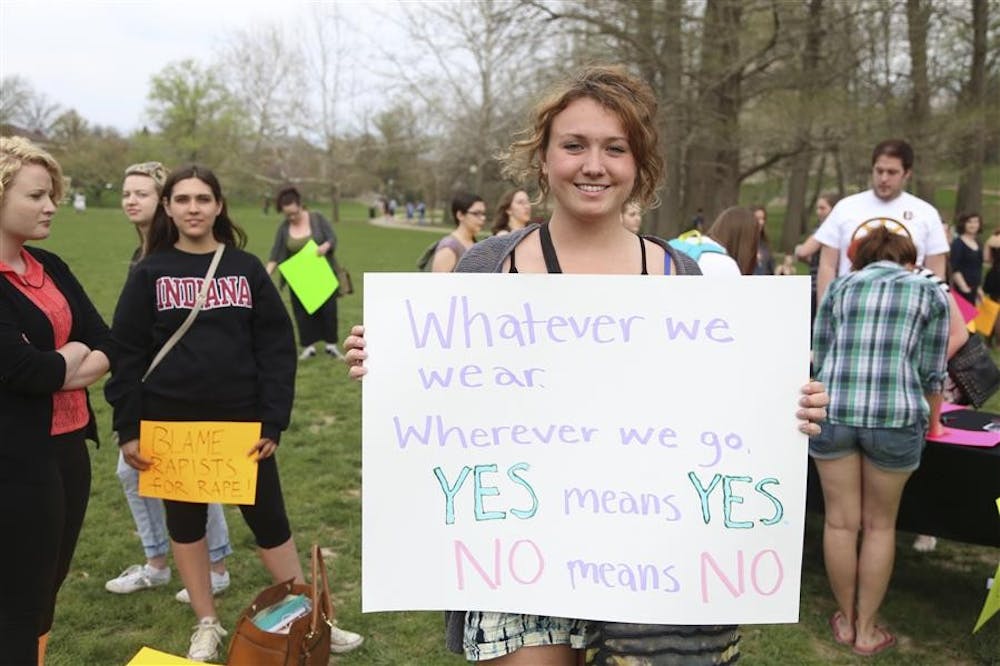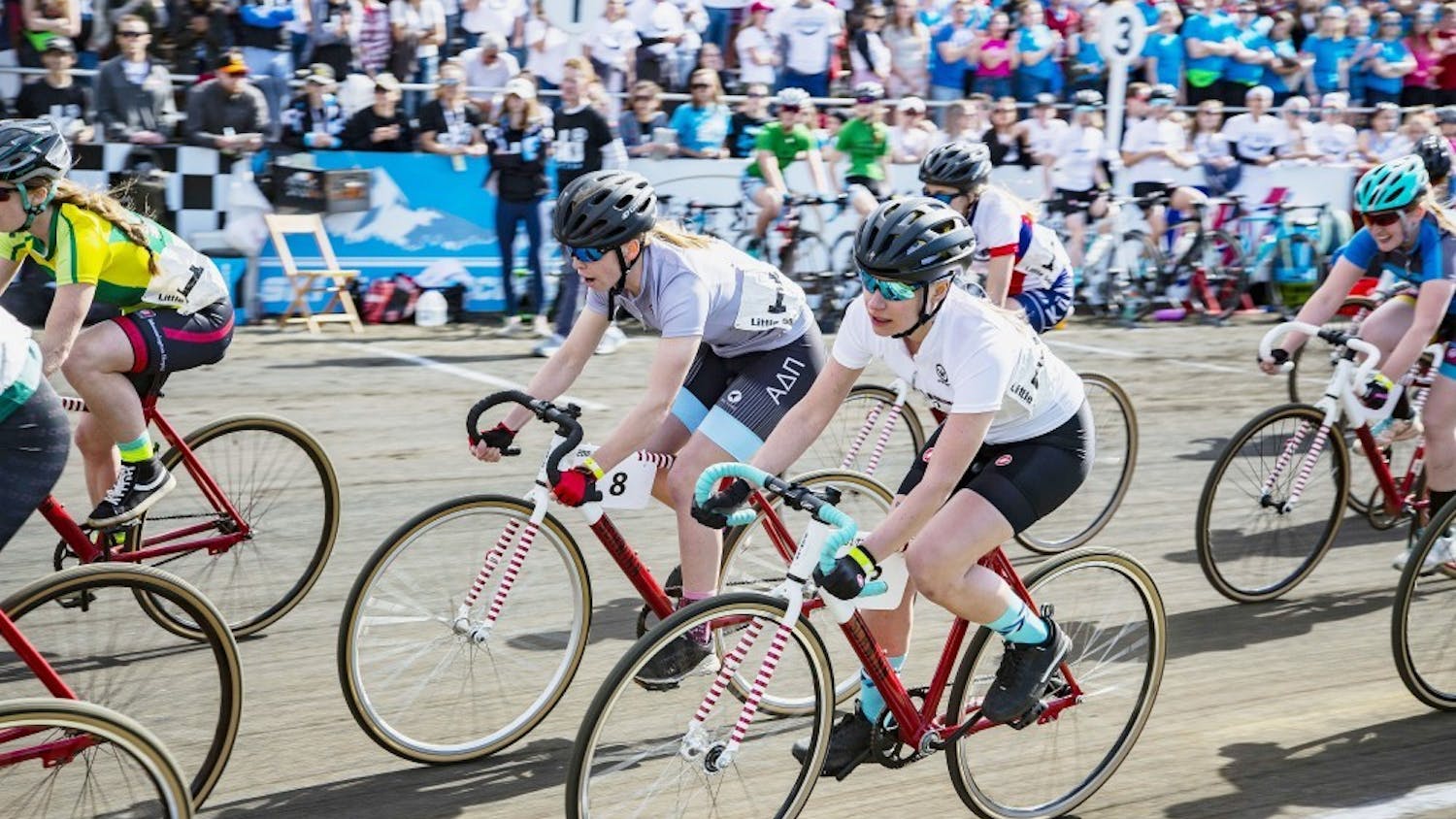Junior Eric Curbow has never been a victim of sexual assault or rape, but it’s an issue close to his heart.
On his 21st birthday, Curbow’s friend was raped in her apartment. Curbow didn’t find out about the rape until a couple of days later.
“It’s horrible and something no one should ever have to face, especially when you’re at home,” Curbow said.
The most difficult part about his friend’s assault, Curbow said, was seeing the emotional and mental toll it took on her. It’s something he said he never wants to see happen to anyone. So on Monday night, he took a stand.
Curbow was one of many men and women who marched through the drizzling rain Monday in the 2014 Slut Walk, sponsored by the IU Women’s Student Association.
Slut Walk is an international movement that seeks to end rape culture and stigmatization against women as instigators of rape.
The catalyst for this movement was Toronto Police Constable Michael Sanguinetti, who gave a statement in 2011 about the force’s views of sexual assault.
“Women should avoid dressing like sluts in order not to be victimized,” Sanguinetti said in the statement.
The movement began in Toronto and was designed to convince the police force to change its stance out of respect to women, but Slut Walk has since broken into an international call for the end of rape culture.
Freshman Morgan Mohr, the director of activism for WSA, said the event seeks to raise awareness for sexual assault at IU.
“It’s such a critical issue, especially here at IU where we have a huge underreporting of rape,” Mohr said. “The problem hasn’t gone away, and we aren’t going away either.”
For the IU event, women were encouraged to come dressed however they wanted.
“To show that rapists, not the victims, are at fault for rape,” a representative posted on the event’s Facebook page.
Women came donning bustiers and fishnet stockings with words like “My Body” and “Still Not Asking For It” scrawled on their bodies. More extreme participants came wearing opened button-down shirts with tape covering their nipples.
Tables were set up offering marchers materials and brochures on sexual assault and how to receive help at IU, courtesy of Counseling and Psychological Services at IU.
There were also stations to make banners to carry during the march, along with suggestions for messages to write.
Most marchers didn’t need the suggestions to create their banners. Emily Gall, a junior studio art and art history major, held up a sign reading “There are no Blurred Lines — FUCK Robin Thicke.” She said her sign was both a testament to her hatred of Thicke and a critique of pop culture’s role in rape culture.
“His song’s just terrible, and everyone just keeps playing it over and over again,” Gall said. “Culture always tells guys ‘You need to get laid’ and ‘You need to be masculine and assertive,’ and for women it’s always ‘Shut up and don’t complain. You’re lucky you got laid.’”
Before the walk began, marchers heard speeches from club officers Connie Lu and Hannah Milner, as well as Stacy Weida, a prevention coordinator at Middle Way House.
The women talked about what the event means to them, and Weida shared the severity of sexual assault within the state.
“The national average for girls in grades nine through 12 is 10.5 percent for rape,” she said. “In Indiana, 17.3 percent of women will be raped before they finish high school.”
Indiana has the second-worst rate in the nation for sexual assault, Weida said.
Participants were encouraged to share their personal connections or reasons behind participating in the march by writing them on slips of paper. WSA officers Mohr and Carmen Vernon read the “Slut Statements” aloud to boost morale before the march.
Statements denouncing rape as a societal problem or a result of the Republican movement perceived as a war on women earned overall approval from the crowd.
One comment from a rape victim received overwhelming applause and cheers from marchers.
“I am here because my rapist tried to stop my spirits, but they failed,” Mohr read. “They don’t get to win. I do. I win every damn day.”
As the march began, participants were warned to refrain from interacting with any members of Trad Youth, who had set up a protest of the march at the corner of Kirkwood and Indiana avenues. Supporters of the Slut Walk attempted to cover the Trad Youth protesters and their sign with sheets.
Matthew Heimbach, a co-founder of Trad Youth, said the issue the group had was with slut culture, not with rape culture and sexual assault.
“We stand against both the slut culture and the bro culture that promotes sexual promiscuity amongst IU students,” Heimbach said. “We came to be able to encourage people to live a modest and chaste lifestyle, but also to stand against the rape culture.”
Trad Youth protesters set up at 6 p.m. with signs reading “Against Rape Culture, Against Slut Culture, Slut Culture Hurts Everyone,” among others.
Tensions were high among Trad Youth members and Slut Walk supporters attempting to hide their protest. One woman holding a sheet felt her breast grazed by a Trad Youth member and angrily called him out on it.
“Is that rape culture?” the Trad Youth member asked. “Do you feel triggered? You don’t look triggered.”
But overall, the event was driven by a desire to empower people of all genders and sexual orientations and to bring down the walls instilled by traditional gender definitions, something Mohr said she knows all too well.
“In my junior year in high school, my AP English teacher told me that I was going to be successful not because I was the smartest, but because I was attractive enough,” Mohr explained. “For me personally, this event is a huge source of empowerment.”
Changing the culture
Students marched through the drizzling rain Monday in the 2014 Slut Walk, seeking to end rape culture and stigmatization against women as instigators of rape.

Get stories like this in your inbox
Subscribe



